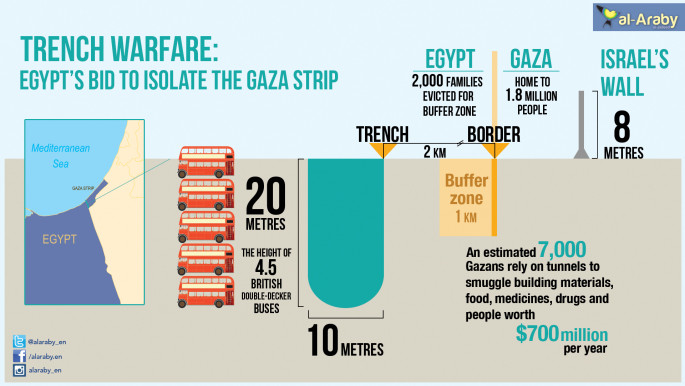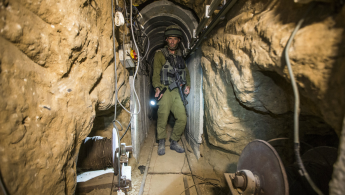Digging deep to survive after Gaza tunnel trade collapses
Abu Jehad Abu Taha, a 42-year-old Gazan art dealer, has lost his business.
The enterprise in Rafah, in southern Gaza, had been going for five years - bringing in Egyptian-made paintings for sale through the infamous tunnels under the Gaza-Egypt border.
He man spends most of his time now chatting with other business owners in the same state.
Abu Jehad's store in the Assalam neighbourhood of Rafah, now has zero goods. It holds just a few plastic chairs upon which his friends gather daily to play cards and chat.
Early business
Abu Jehad, a father of 14 and husband of two, worked as a contractor in Rafah between 2000 and 2007. Back then, his business, along with many others across the occupied coastal territory, were quite regular.
"I used to have several workers and the business was quite good and enabled me to earn a good living," he told al-Araby al-Jadeed. "Yet, in 2007, when Israel imposed a total closure on border crossings, myself and my workers stopped working.
"The year that followed, I mean from 2007 to 2008, was a very difficult time for me, as I had little chance to work, only for a few times - and this had affected my family so badly."
Tunnels
Abu Jehad turned to the tunnels because of the Israeli border closure on Gaza. In desperation to earn a living and help his family get by, he wanted to restart his old business in Rafah:
"Necessity is the mother of invention, and as the situation here was very difficult under the Israeli blockade, I got the use of an underground tunnel on the Gaza-Egypt border."
| Necessity is the mother of invention, and as the situation here was very difficult... I got the use of a tunnel. - Abu Jehad |
While the number of tunnels increased after 2008, many had been there long before the blockade began.
"In 2008, I managed to keep in contact with a tunnel's owner, who helped me get some paintings from Egypt and I started selling them out in the local market," Abu Jehad said.
Tough times
Despite rebuilding his business, Abu Jehad dreamed of the time when Israel would re-open the legitimate border crossings and he could stop his underground trade.
"Though my own economic conditions notably improved during the tunnels trade, the business itself was like a curse on me - as I had been hit by fears, worry and stress," he said.
"It was such an illegal way - 'smuggling' - to bring in essential goods and commodities, into the Gaza Strip."
Egyptian authorities themselves often cracked down on the tunnel trade.
"In the summer of 2011, the Egyptian van driver who brought me a shipment from Cairo worth $5,000, informed me that the entire shipment was confiscated by Egyptian security, about two kilometres from the border," he told al-Araby.
| The business itself was like a curse on me - as I had been hit by fears, worry and stress. - Abu Jehad |
"It took me at least ten days before I managed to restore the shipment, through mediations and contacts inside Egypt."
Abnormal trade, abnormal life
Abu Jehad said the tunnel trade was never a normal way of business, and never a normal way of life.
"During many of my transactions, I used to lose about 20 to 30 percent of the imported goods, mainly during loading either on the Egyptian or the Gaza side of the border," he said.
"I had no mood or ability to run a normal life of my own. However, my business from 2008 to 2013 was quite lucrative - I used to spend all of my time away from home, either in the store or on the border, taking care of my shipments. Sometimes, I used to stay a whole night, looking forward to getting my shipment, from the Egyptian side."
| [article continues below] | |
 |
Prolonged sleep
In the summer of 2013, Egypt's military ousted President Mohamed Morsi. Under Morsi's year-long rule of Egypt, the tunnels had flourished and the movement of Palestinians in and out of Hamas-ruled Gaza became frequent.
But since the coup, two years ago this week, the Egyptian military has managed to shut down many hundreds of the tunnel lifelines, on which the Israel-besieged Gaza Strip, relies.
Despite the fact that the tunnels have now stopped fuctioning, almost completely, Abu Jehad continues to hope that the situation in Gaza improves and the Israeli siege is lifted, once and for all.
"Over the past year, I used to sleep prolonged hours, trying to stay away from any family pressure, in terms of many needs that I should meet for the household," he said.
"My business in the paintings trade was very good and lucrative, yet over the past year, I have lost a lot of my own savings and for the moment, I earn nothing."
Abu Jehad called on both the Islamist Hamas party and the Fatah party of Palestinian President Mahmoud Abbas to end their political division inorder for some sort of hope to emerge.
"I appeal to all concerned parties to help relieve the lives of the people, including that of myself, and of many others, who relied on underground trade."



